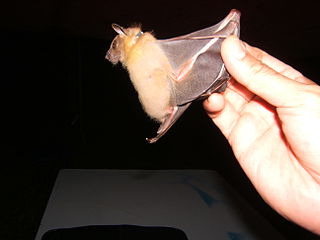
Coronaviruses are a group of related RNA viruses that cause diseases in mammals and birds. In humans and birds, they cause respiratory tract infections that can range from mild to lethal. Mild illnesses in humans include some cases of the common cold, while more lethal varieties can cause SARS, MERS and COVID-19, which is causing the ongoing pandemic. In cows and pigs they cause diarrhea, while in mice they cause hepatitis and encephalomyelitis.

Coronaviridae is a family of enveloped, positive-strand RNA viruses which infect amphibians, birds, and mammals. The group includes the subfamilies Letovirinae and Orthocoronavirinae; the members of the latter are known as coronaviruses.
Avian coronavirus is a species of virus from the genus Gammacoronavirus that infects birds; since 2018, all gammacoronaviruses which infect birds have been classified as this single species. The strain of avian coronavirus previously known as infectious bronchitis virus (IBV) is the only coronavirus that infects chickens. It causes avian infectious bronchitis, a highly infectious disease that affects the respiratory tract, gut, kidney and reproductive system. IBV affects the performance of both meat-producing and egg-producing chickens and is responsible for substantial economic loss within the poultry industry. The strain of avian coronavirus previously classified as Turkey coronavirus causes gastrointestinal disease in turkeys.

Cynopterus is a genus of megabats. The cynopterine section is represented by 11 genera, five of which occur in Malaysia, namely, Chironax, Balionycteris, Penthetor, Dyacopterus, and Cynopterus. About 30 names for Cynopterus species have been proposed, but only 16 are taxonomically valid forms.

Human coronavirus NL63 (HCoV-NL63) is a species of coronavirus, specifically a Setracovirus from among the Alphacoronavirus genus. It was identified in late 2004 in patients in the Netherlands. The virus is an enveloped, positive-sense, single-stranded RNA virus which enters its host cell by binding to ACE2. Infection with the virus has been confirmed worldwide, and has an association with many common symptoms and diseases. Associated diseases include mild to moderate upper respiratory tract infections, severe lower respiratory tract infection, croup and bronchiolitis.

Murine coronavirus (M-CoV) is a virus in the genus Betacoronavirus that infects mice. Belonging to the subgenus Embecovirus, murine coronavirus strains are enterotropic or polytropic. Enterotropic strains include mouse hepatitis virus (MHV) strains D, Y, RI, and DVIM, whereas polytropic strains, such as JHM and A59, primarily cause hepatitis, enteritis, and encephalitis. Murine coronavirus is an important pathogen in the laboratory mouse and the laboratory rat. It is the most studied coronavirus in animals other than humans, and has been used as an animal disease model for many virological and clinical studies.

Alphacoronaviruses (Alpha-CoV) are members of the first of the four genera of coronaviruses. They are positive-sense, single-stranded RNA viruses that infect mammals, including humans. They have spherical virions with club-shaped surface projections formed by trimers of the spike protein, and a viral envelope.

Betacoronavirus 1 is a species of coronavirus which infects humans and cattle. The infecting virus is an enveloped, positive-sense, single-stranded RNA virus and is a member of the genus Betacoronavirus and subgenus Embecovirus. Like other embecoviruses, it has an additional shorter spike-like surface protein called hemagglutinin esterase (HE) as well as the larger coronavirus spike protein.

Human coronavirus 229E (HCoV-229E) is a species of coronavirus which infects humans and bats. It is an enveloped, positive-sense, single-stranded RNA virus which enters its host cell by binding to the APN receptor. Along with Human coronavirus OC43, it is one of the viruses responsible for the common cold. HCoV-229E is a member of the genus Alphacoronavirus and subgenus Duvinacovirus.

Coronavirus diseases are caused by viruses in the coronavirus subfamily, a group of related RNA viruses that cause diseases in mammals and birds. In humans and birds, the group of viruses cause respiratory tract infections that can range from mild to lethal. Mild illnesses in humans include some cases of the common cold, while more lethal varieties can cause SARS, MERS and COVID-19. As of 2021, 45 species are registered as coronaviruses, whilst 11 diseases have been identified, as listed below.
Igacovirus is a subgenus of viruses in the genus Gammacoronavirus.

Alphacoronavirus 1 is a species of coronavirus that infects cats, dogs and pigs. It includes the virus strains feline coronavirus, canine coronavirus, and transmissible gastroenteritis virus. It is an enveloped, positive-strand RNA virus which is able to enter its host cell by binding to the APN receptor.
China Rattus coronavirus HKU24 is a species of coronavirus in the genus Betacoronavirus.
Myodes coronavirus 2JL14 is a species of coronavirus in the genus Betacoronavirus.
Common moorhen coronavirus HKU21 is a species of coronavirus in the genus Deltacoronavirus.
Munia coronavirus HKU13 is a species of coronavirus in the genus Deltacoronavirus.
Avian coronavirus 9203 is a species of coronavirus in the genus Gammacoronavirus.
Duck coronavirus 2714 is a species of coronavirus in the genus Gammacoronavirus.
Bat coronavirus HKU10 is a species of coronavirus in the genus Alphacoronavirus.
Pipistrellus kuhlii coronavirus 3398 is a species of coronavirus in the genus Alphacoronavirus.









